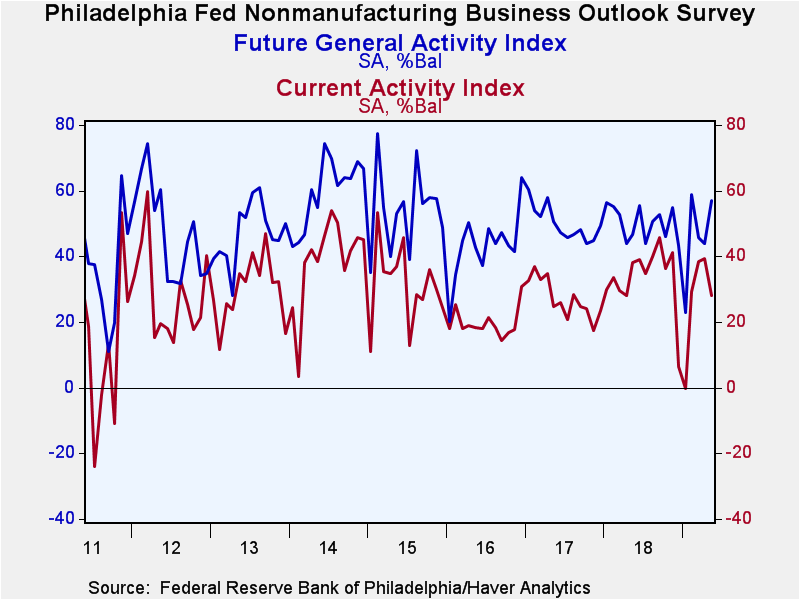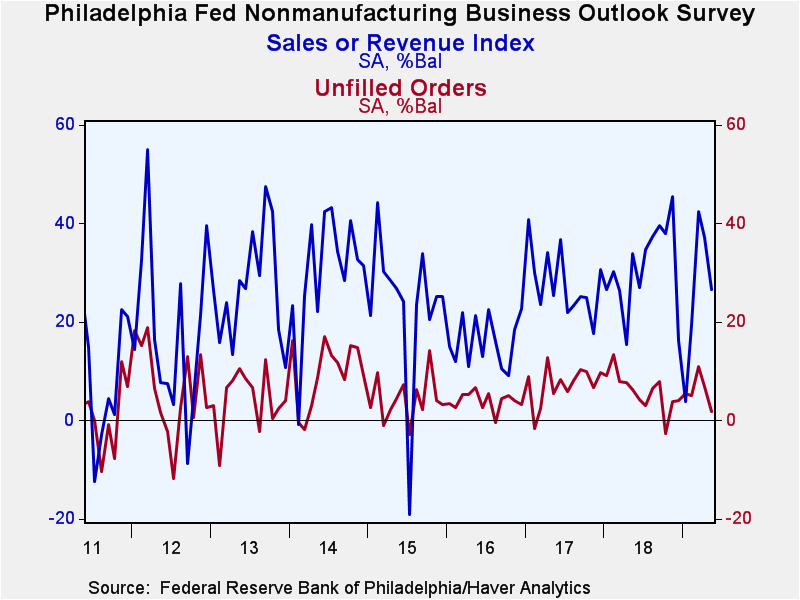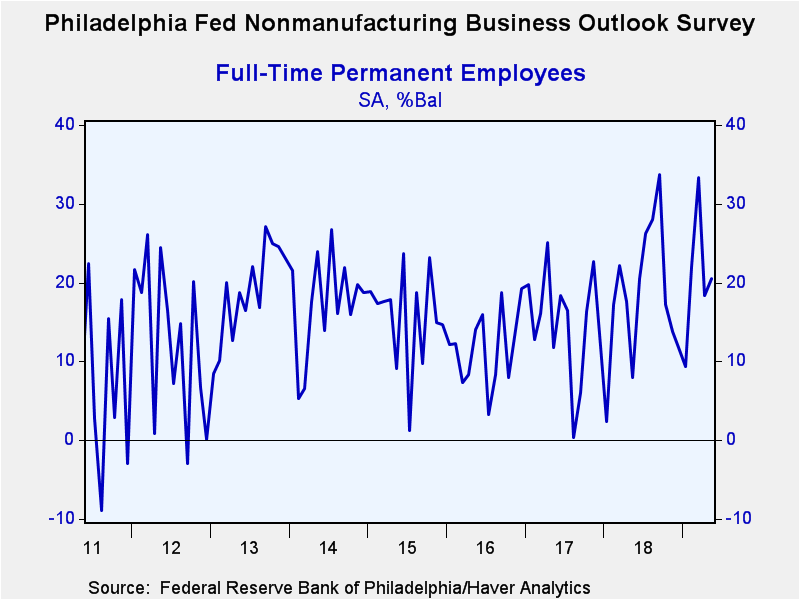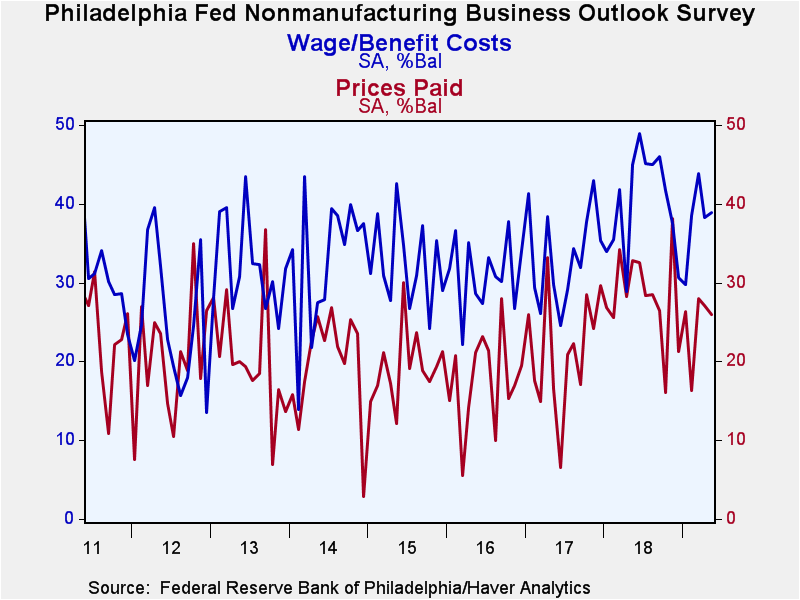 Global| May 21 2019
Global| May 21 2019Philadelphia Fed Nonmanufacturing Business Activity Index Weakens
by:Tom Moeller
|in:Economy in Brief
Summary
The Federal Reserve Bank of Philadelphia reported that its Nonmanufacturing Business Index of current conditions at the company level fell to 28.1 during May after rising slightly in April. These figures remain below the high of 45.7 [...]
The Federal Reserve Bank of Philadelphia reported that its Nonmanufacturing Business Index of current conditions at the company level fell to 28.1 during May after rising slightly in April. These figures remain below the high of 45.7 reached in September of last year. The index of expected business conditions rose to 56.9, a three-month high.
Weakness in the overall survey reflected declines in most of the sub-series. The new orders index declined to the lowest level since January. The sales measure weakened to a three-month low and unfilled orders fell sharply. The inventories measure fell to nearly a three-year low.
The labor market measures were mixed. The full-time permanent employment improved slightly and has been trending upward for two years. The part-time/temporary employment and the workweek figures fell m/m, but also have been trending higher. The wages & benefits measure was little changed m/m, well below last year's highs.
On the pricing front, the prices paid measure declined m/m and was below the 2018 high. The prices received index improved markedly.
The capital expenditure measures on both plant & equipment improved m/m but remained well below the highs registered in earlier years.
The Philadelphia Fed figures are diffusion indexes which are calculated by subtracting the percent of respondents reporting poorer business conditions from those reporting improvement. So, readings above zero indicate more positive than negative responses. These indexes have a good correlation with growth in the series covered. The data are available in Haver's SURVEYS database.
| Federal Reserve Bank of Philadelphia: Nonmanufacturing Business Outlook Survey (Diffusion Index, SA) | May | Apr | Mar | May'18 | 2018 | 2017 | 2016 |
|---|---|---|---|---|---|---|---|
| General Activity - Company | 28.1 | 39.2 | 38.3 | 38.1 | 33.6 | 27.3 | 19.7 |
| New Orders | 10.6 | 25.4 | 24.5 | 32.1 | 24.3 | 19.1 | 15.8 |
| Sales or Revenue | 26.6 | 37.2 | 42.5 | 34.0 | 30.9 | 27.9 | 16.1 |
| Inventories | -3.2 | 0.8 | 10.3 | 7.0 | 5.2 | 3.8 | 4.3 |
| Number of Full-Time Permanent Employees | 20.5 | 18.3 | 33.3 | 7.9 | 18.2 | 14.8 | 11.7 |
| Prices Paid | 25.9 | 27.1 | 28.0 | 32.8 | 28.3 | 21.4 | 17.6 |
| Wage & Benefit Costs | 38.9 | 38.2 | 43.8 | 45.0 | 40.0 | 33.4 | 31.2 |
| Expected General Activity - Company | 56.9 | 44.0 | 45.8 | 46.6 | 50.2 | 50.1 | 43.2 |
Tom Moeller
AuthorMore in Author Profile »Prior to joining Haver Analytics in 2000, Mr. Moeller worked as the Economist at Chancellor Capital Management from 1985 to 1999. There, he developed comprehensive economic forecasts and interpreted economic data for equity and fixed income portfolio managers. Also at Chancellor, Mr. Moeller worked as an equity analyst and was responsible for researching and rating companies in the economically sensitive automobile and housing industries for investment in Chancellor’s equity portfolio. Prior to joining Chancellor, Mr. Moeller was an Economist at Citibank from 1979 to 1984. He also analyzed pricing behavior in the metals industry for the Council on Wage and Price Stability in Washington, D.C. In 1999, Mr. Moeller received the award for most accurate forecast from the Forecasters' Club of New York. From 1990 to 1992 he was President of the New York Association for Business Economists. Mr. Moeller earned an M.B.A. in Finance from Fordham University, where he graduated in 1987. He holds a Bachelor of Arts in Economics from George Washington University.










